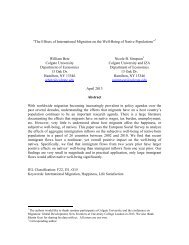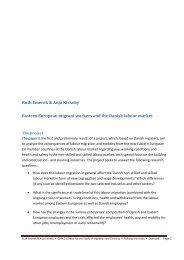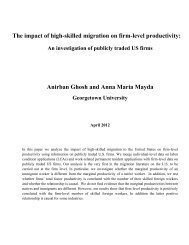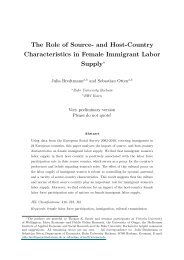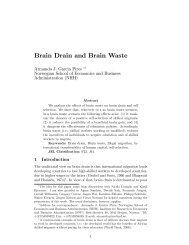La politique française de co-développement - CReAM
La politique française de co-développement - CReAM
La politique française de co-développement - CReAM
You also want an ePaper? Increase the reach of your titles
YUMPU automatically turns print PDFs into web optimized ePapers that Google loves.
3.1. Fostering social inclusion<br />
A <strong>co</strong>herent integration policy requires fighting against the social exclusion of immigrants, which<br />
remains the primary <strong>de</strong>terrent to a full integration experience. In particular, immigrants should be<br />
free of discrimination on the labour market. There is no reason for an immigrant with certain<br />
characteristics to be paid less than a native with similar characteristics for the same job. This implies<br />
the participation of the state (access to services), but also from the locals (perception) and<br />
immigrants themselves (separation through enclaves).<br />
<br />
<br />
<br />
<br />
The most basic requirement for successful integration of immigrants is to move towards a<br />
human rights approach to migration policy. Normative and institutional structures may be on<br />
the rise 7 , but enforcement is low and many migrants, in particular those in transit, are victims<br />
of trafficking and the worse forms of human rights violations. This can be minimised by<br />
enforcing protective measures for immigrants, above all unac<strong>co</strong>mpanied children and<br />
women, through awareness-raising campaigns targeting the local population, including<br />
immigration and police officers, but also by imposing sanctions on the perpetrators.<br />
Freeing and facilitating access to short-term services, such as housing and health, is a primary<br />
requirement in raising the living and working standards of immigrants. Many of them are<br />
isolated as individuals or groups and do not fully participate in civic society. This is in large<br />
part because they lack the basic educational, health and financial levels necessary to access<br />
the institutions of civil society. As an example, Thailand, with the support of the IOM,<br />
launched a program in 2003 to <strong>de</strong>al with health issues and well-being of immigrants from<br />
neighbouring <strong>co</strong>untries, regardless of their legal status.<br />
Policies need to ensure that immigrants, particularly those who are stuck in bad and/or<br />
informal jobs, are not further pushed away into unsafe and hazardous jobs. The United Arab<br />
Emirates, for instance, have recently moved to sign Memoranda of Un<strong>de</strong>rstanding with<br />
several <strong>co</strong>untries that inclu<strong>de</strong> provisions for fair treatment and pay on the labour market and<br />
safety at work.<br />
Even in <strong>co</strong>ntexts of strong legislation against xenophobia and discrimination, the largely<br />
informal labour market ensures that unfavourable practices remain. As such, local<br />
perceptions should be the primary target of policy makers. In South Africa, immigration from<br />
the North has alerted the upper echelons of government policy-making, due to a rise in<br />
violence against immigrants, mainly Zimbabweans. The government has taken responsibility<br />
for fighting negative perceptions (see Box 2).<br />
7 In 2000, a set of three proto<strong>co</strong>ls (The Palermo Proto<strong>co</strong>ls) on trafficking were adopted by the United Nations.<br />
Since its entry into force in 2003 many <strong>co</strong>untries have passed strong legislation against human trafficking.<br />
15



